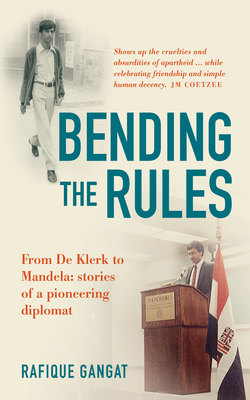Читать книгу Bending the Rules - Rafique Gangat - Страница 5
На сайте Литреса книга снята с продажи.
OMO AND AMEEN
ОглавлениеIt’s all about marketing
KwaZulu-Natal’s Noodsberg region is lush and green, with sugarcane fields and tree plantations, rolling hills and grassy valleys cascading onto the coastal plains and eventually tumbling into the Indian Ocean.
My grandfather was the only Indian who owned a farm in the area, amid a host of white farmers of German descent. There were wattle plantations on the farm and he grew sugar cane, but his primary business was a general dealer’s store that catered for the basic needs of the locals.
When I was a young boy, my brother Shiraz and I spent most of our school holidays on the farm. Every day was full of adventure and discovery; it had to be with so much freedom and space, and a marvellous world to explore. The garden, which flowed down to the stream, was my grandfather’s pride and joy – especially the tropical fruit. Shiraz and I feasted on loquats or guavas after risking life and limb to reach the most succulent fruit, which always seemed to grow high up on flimsy branches. Having reached our prize, we’d sit in the tree like monkeys and gorge ourselves till our bellies ached.
The wide-open spaces fired our imagination and we came up with all sorts of games – cowboys and crooks being a favourite. We built tree houses, and collected plants and insects to create our own “insect zoo”. Something that always puzzled us was why shongologos (millipedes) were so shy and curled up.
Even the weather was spectacular. After a day of sunshine, a blanket of mist would envelop the place late every afternoon. Far from dampening our spirits, it led to lively card games or Monopoly, played in the warmth of the kitchen or living room under the loving care of our grandmother, who indulged us with tasty snacks.
The heart of her kitchen was an ornately decorated cast-iron stove. I spent many evenings getting it going with wood, feeding its great mouth with coal and then stoking the fire. As a small boy of about eight years old, I was fascinated by the power of fire – and the ability to control it.
One afternoon, before the mist rolled in, Shiraz and I were playing a game of cricket. Empty wooden Coke crates stood in for wickets and we kept up a lively running commentary of our match, ball by ball.
Our attention was distracted by the arrival of a large truck from Durban, which pulled up at my grandfather’s store. Instead of offloading supplies, the driver, led by a white manager and his assistants, quickly and efficiently strung up a white cloth across the back of the closed truck. They then set up a film projector, drawing electricity from the store via a long cable.
As they fitted the reels and got everything working, a throng of curious onlookers crowded around the truck, jostling to get a better view. Eagerly anticipating a film (known as a bioscope), we abandoned our cricket and joined the group.
Soon the reels began to roll, but instead of a Western, or even a cartoon, the “film” was about washing clothes with a soap powder that promised to make them sparkling clean. Despite the domestic subject matter, many in the audience were awestruck; they were seeing a movie for the first time in their lives. At that stage television had not come to South Africa and rural black folk had no access to movies. Some, particularly farm labourers who had not had much exposure to modernisation, considered this to be magic. They were highly impressed with the assistants who, they believed, were using a machine to cast a spell that showed on the screen.
Once the film ended, dinky boxes of soap powder were freely distributed. I, too, received a cute little box with blue and white writing on it. Once everyone was clutching a box, the man standing at the back of the truck held his sample aloft and shouted “I say Omo” – followed by a chant of “Omo! Omo!”, which the crowd took up with great enthusiasm. Even after the chanting tailed off, the name Omo kept ringing in my ears.
The white manager, from the company Lever Brothers, stood by and silently orchestrated proceedings while his black assistants played their designated roles. When the show was over, the manager sold cartons of Omo to my grandfather, who displayed them in his store for resale. This novelty show was how soap powder was introduced to the rural populace of KwaZulu-Natal.
Many years later, at high school in Pietermaritzburg, I became friendly with Yunie and BG. Both had grown up on farms in KwaZulu-Natal and their families had general dealer stores similar to that of my grandfather.
Our rural upbringing distinguished us from city kids, so we naturally gravitated together and formed an unbreakable bond of friendship. We had so much in common that we regarded our friendship as a brotherhood.
One Friday, all three of us were sitting in mosque, listening intently to a sermon being delivered by the Imam. He had a real aura about him – augmented by his religious garb and proficient recitation of verses from the Holy Quran – and was revered by the flock of worshippers. At opportune moments the Imam would pause for the shrill affirmation of “ameen” from his congregation. Out of the blue, just as everyone exclaimed “ameen”, BG chimed in with a loud “Omo!” Every last soul turned to stare at us and, to make matters worse, Yunie and I simply cracked up laughing.
BG’s association put things in perspective: a religious sermon and a marketing pitch for soap powder boiled down to much the same thing.
